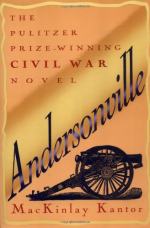Since the above matter was first published in the Blade, a friend has sent me a transcript of the evidence at the Wirz trial, of Professor Joseph Jones, a Surgeon of high rank in the Rebel Army, and who stood at the head of the medical profession in Georgia. He visited Andersonville at the instance of the Surgeon-General of the Confederate States’ Army, to make a study, for the benefit of science, of the phenomena of disease occurring there. His capacity and opportunities for observation, and for clearly estimating the value of the facts coming under his notice were, of course, vastly superior to mine, and as he states the case stronger than I dare to, for fear of being accused of exaggeration and downright untruth, I reproduce the major part of his testimony—embodying also his official report to medical headquarters at Richmond—that my readers may know how the prison appeared to the eyes of one who, though a bitter Rebel, was still a humane man and a conscientious observer, striving to learn the truth:
Medicaltestimony.
[Transcript from the printed testimony at the Wirz Trial, pages 618 to 639, inclusive.]
October7, 1885.
Dr. Joseph Jones, for the prosecution:
By the Judge Advocate:
Question. Where do you reside
Answer. In Augusta, Georgia.
Q. Are you a graduate of any medical college?
A. Of the University of Pennsylvania.
Q. How long have you been engaged in the practice of medicine?
A. Eight years.
Q. Has your experience been as a practitioner, or rather as an investigator of medicine as a science?
A. Both.
Q. What position do you hold now?
A. That of Medical Chemist in the Medical College
of Georgia, at
Augusta.
Q. How long have you held your position in that college?
A. Since 1858.
Q. How were you employed during the Rebellion?
A. I served six months in the early part of it as a private in the ranks, and the rest of the time in the medical department.
Q. Under the direction of whom?
A. Under the direction of Dr. Moore, Surgeon General.
Q. Did you, while acting under his direction, visit Andersonville, professionally?
A. Yes, Sir.
Q. For the purpose of making investigations there?
A. For the purpose of prosecuting investigations
ordered by the Surgeon
General.
Q. You went there in obedience to a letter of instructions?
A. In obedience to orders which I received.
Q. Did you reduce the results of your investigations to the shape of a report?
A. I was engaged at that work when General Johnston surrendered his army.
(A document being handed to witness.)
Q. Have you examined this extract from your report and compared it with the original?




